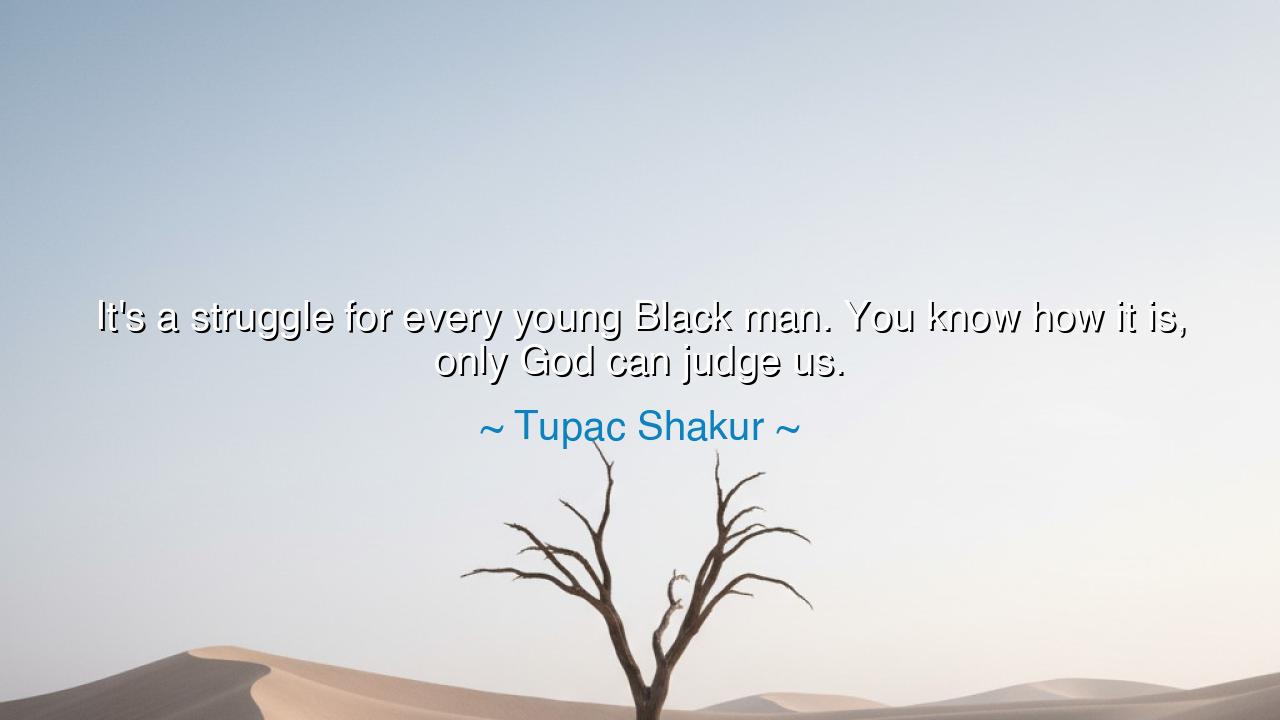
It's a struggle for every young Black man. You know how it is






“It’s a struggle for every young Black man. You know how it is, only God can judge us.” — Tupac Shakur
Listen, O seeker of truth, to the voice of Tupac Shakur, the poet-warrior of the modern age, whose words carried the pain and promise of an entire generation. When he spoke these words, he did not speak only for himself — he spoke for the millions who have lived in struggle, who have fought to be seen, to be understood, and to be free. His declaration, “only God can judge us,” echoes the ancient wisdom of prophets and kings, yet it rises from the streets, born of suffering and defiance. In it we hear both lament and liberation: a cry against the world’s condemnation, and a reminder that final judgment belongs only to the Creator, who alone knows the heart of man.
The origin of this quote springs from Tupac’s own life — a life of contradiction and conviction, light and darkness. Born into poverty, shaped by violence, and haunted by the legacy of oppression, he was a soul too vast to fit the world’s expectations. His music and his words reflected the storm within and around him. He saw the struggle of young Black men — a struggle not only for survival, but for dignity in a society that often viewed them through the lens of fear. Yet amid this chaos, Tupac turned his eyes to heaven. He did not claim perfection, but he claimed faith: that God alone could measure the truth of his soul, because God alone could see the full story behind his scars.
When Tupac said, “It’s a struggle for every young Black man,” he named a reality carved by history itself. From the chains of slavery to the battles of segregation, from the ghettos to the prisons, the Black man’s road in America has been marked with hardship and resilience. Tupac carried that weight, and through his art, he gave it voice. Yet his words transcend time and race — for all who have been misunderstood, judged, or condemned, this truth remains: that the soul’s worth cannot be measured by man’s opinion. Only the Divine, who sees the heart beyond the act, the cause behind the choice, can truly understand and absolve.
There is an echo of ancient wisdom in his defiance. For long before Tupac, another man stood condemned by society — Jesus of Nazareth, judged by the very people He came to save. The crowd saw only a criminal; God saw the Redeemer. Likewise, Tupac’s cry — “only God can judge us” — is not rebellion against righteousness, but a plea for compassion, for the understanding that human beings are complex, molded by forces unseen. It is a reminder that judgment without empathy is cruelty, and that mercy belongs to Heaven.
Consider also the story of Nelson Mandela, who, like Tupac, was once branded a criminal and locked behind iron bars. Yet history, in its long wisdom, revealed the truth: that Mandela’s struggle was not wickedness, but courage. The same man the world once condemned became the one it later crowned with honor. Here too, Tupac’s words find their power — “only God can judge us” — for human judgment is clouded by fear and ignorance, while divine judgment sees beyond time, beyond circumstance, beyond mistake.
Tupac’s statement carries another truth — the sacred dignity of the individual soul. He reminds us that to live is to struggle, and to struggle is not to fail. Every man, whether saint or sinner, walks a path that only he and God can fully comprehend. To judge others is easy; to understand them is divine. Thus, his words become both shield and mirror — a shield against condemnation, and a mirror to those who judge too quickly.
The lesson, then, is this: strive for understanding before judgment, for compassion before criticism. Recognize the unseen battles others fight. When you see a man stumble, do not rush to cast stones — for the same God who judges him will one day judge you. And if you are the one who struggles, remember Tupac’s wisdom: you are not defined by your pain, nor destroyed by your past. Lift your head, for the same God who watches your struggle also shapes your destiny.
So, O child of the streets and the stars, carry these words as armor for your soul: “Only God can judge us.” Let them remind you to live with authenticity and humility — to seek not the approval of man, but the peace that comes from divine understanding. For the world may label, condemn, and misunderstand, but the Creator knows your truth. And in that knowing lies freedom — the kind that no man can grant, and no man can take away.






AAdministratorAdministrator
Welcome, honored guests. Please leave a comment, we will respond soon